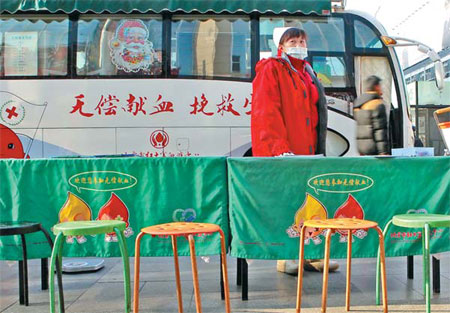Patients may be their own best blood donors
Updated: 2011-12-27 08:17
By Yang Wanli and He Na in Beijing, and Tang Yue in Tianjin (China Daily)
|
|||||||||
|
Despite the festive spirit, a blood donation point in Wangfujing, a prime shopping district of Beijing, struggles to attract donors on Monday. A shortage of donated blood means operations are delayed at many hospitals. [Wang Jing / China Daily] |
High costs and poor publicity hinder process from gaining greater popularity, Yang Wanli and He Na in Beijing, and Tang Yue in Tianjin report.
Li Dongliang, 47, had his right knee replaced in early September. He used 1,900 cubic centimeters of donated blood during the surgery in Yunnan.
Because there is always a shortage of donated blood, three of his relatives contributed 1,100 cc at the local donation center to reduce Li's waiting time for the operation.
Prior to the operation nobody mentioned a better option - autotransfusion.
"What's that?" Li's wife asked.
After being told it's a process that allows patients to bank their own blood ahead of time or for blood to be salvaged during surgery, she said: "No doctor told us about it. If we had known earlier, we would have asked for it instead of using donor blood."
The primary advantage of autotransfusion is that it eliminates the introduction of undetected disease. It also is considered to be the most effective and economical way to manage blood loss in emergencies.
But it is little used in China. The equipment is expensive, and some hospitals are not set up to store the blood properly. Some people fear that self-donating blood might be too taxing, or that their blood might be misused, or that the process isn't sufficiently regulated.
The biggest reason, however, is that too few people know about it.
"I haven't met a single person who raised the question of autotransfusion to me. Never," said Cheng Gang, deputy director of Jinan Blood Station in Shandong province.
Out of 25 people lined up to register at Beijing's Sino-Japanese Friendship Hospital on a Wednesday morning, only one had even heard the word before.













